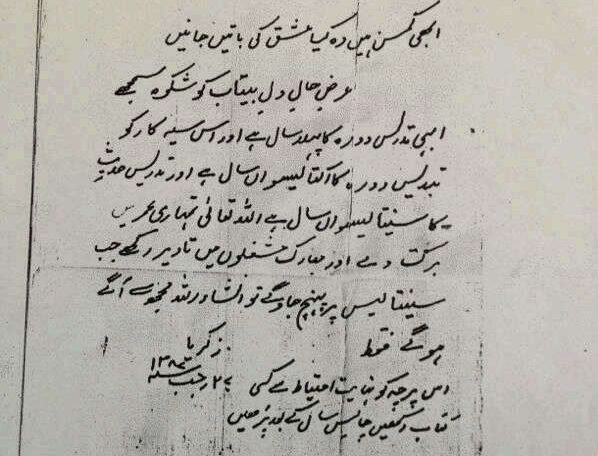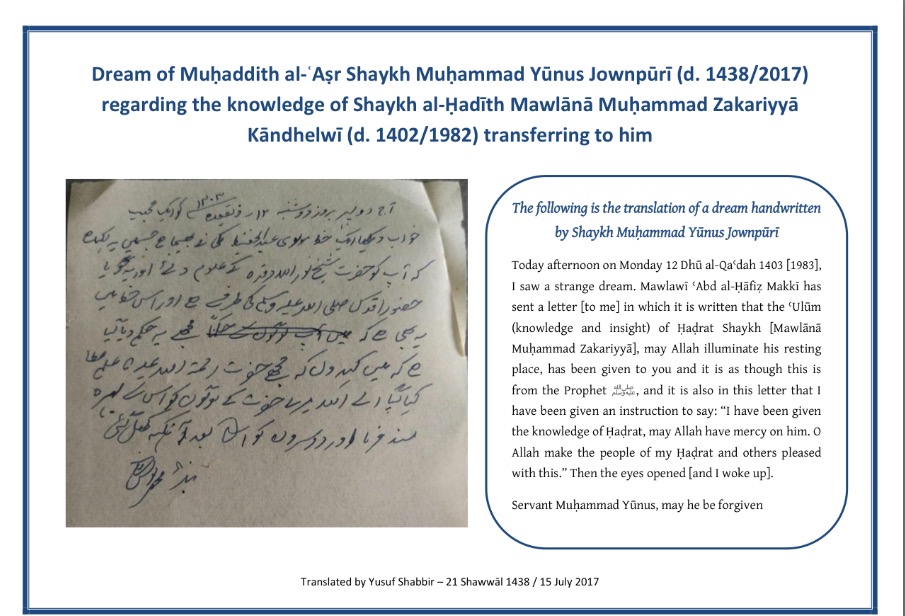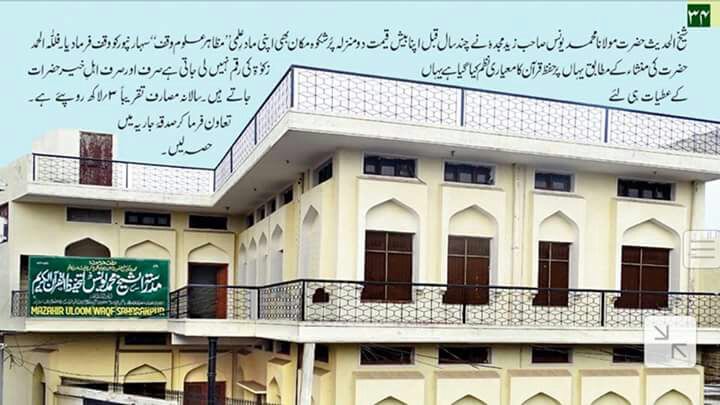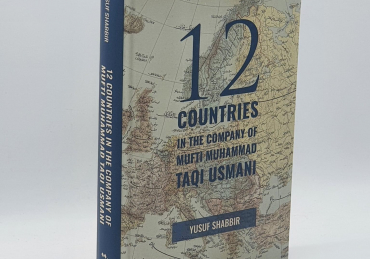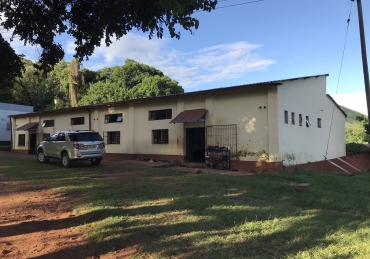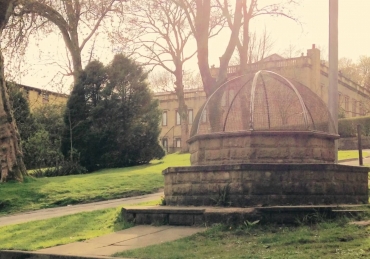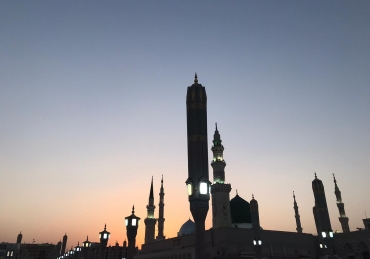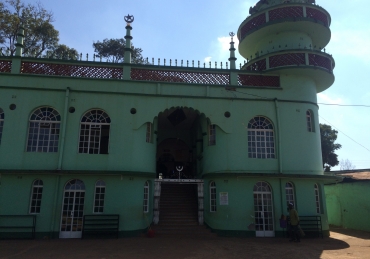Obituary: Muḥaddith al-ʿAṣr Shaykh al-Ḥadīth Mawlānā Muḥammad Yūnus Jownpūrī
بسم الله الرحمن الرحیم
It is with great sadness and sorrow we received the news of the demise of our teacher and the teacher of our teachers, Muḥaddith al-ʿAṣr Shaykh al-Ḥadīth Mawlānā Muḥammad Yūnus Jownpūrī (d. 1438/2017) this morning at approximately 5am British Summer Time. When I retired to sleep just after 2am, I had received the news of the demise of Ḥaḍrat Mawlānā Ismāʿīl Badāt a resident of the blessed city of Madīnah, who like Shaykh Muḥammad Yūnus Jownpūrī was a disciple of Shaykh al-Ḥadīth Mawlānā Muḥammad Zakariyyā Kāndhelwī (d. 1402/1982). People from across the world have expressed their sorrow and grief and shared their condolences online and in person. My respected father Mufti Shabbīr Aḥmad (b. 1376/1957), who is one of the senior students and disciples of Shaykh Muḥammad Yūnus Jownpūrī, suggested to me to pen a brief obituary. The truth is that words cannot do justice to his personality but nonetheless an attempt is made to provide readers a brief insight into his life drawing from some of the published material as well as my personal experiences and the experiences of others, particularly, my respected father as well as Shaykh’s assistant and disciple Mawlānā Yūnus Randerā who relentlessly served Shaykh over the past two decades.
Birth and Early Life
Muḥaddith al-ʿAṣr Shaykh al-Ḥadīth Mawlānā Muḥammad Yūnus ibn Shabbīr Aḥmad ibn Sher ʿAlī was born on Saturday 2 October 1937 (this corresponds to 25 or 26 Rajab 1356, not 1355) in Jownpur in Uttar Pradesh, India. At the age of five, his mother passed away and he was looked after by his maternal grandmother who was extremely pious and affectionate towards him. He undertook his early Islamic education at Madrasah Ḍiyāʾ al-ʿUlūm Jownpūr under the tutelage of Mawlānā Ḍiyāʾ al-Ḥaq Fayḍʾābādī for whom Shaykh always expressed gratitude. I heard Shaykh on numerous occasions praise and recollect his encounters with Mawlānā Ḍiyāʾ al-Ḥaq Fayḍʾābādī and recall his benevolence towards him. After Mawlānā Ḍiyāʾ al-Ḥaq’s demise, some people claimed that he owed them some money based on a dispute. Shaykh asked Mufti Kifāyatullāh and together gave the claimants what they were demanding.
Shaykh would regularly mention how his father had intended for him to work as a farmer or earn a living for the family through other means, however, he was interested in acquiring Islamic education. Thus, his pursuit of knowledge started in Jownpur where he studied for several years and in Shawwāl 1377, he travelled to Saharanpur and enrolled at the famous seminary Maẓāhir al-ʿUlūm from which he graduated in 1380. During the three years, he studied under great luminaries most notably Shaykh al-Ḥadīth Mawlānā Muḥammad Zakariyyā Kāndhelwī (d. 1402/1982) and Mawlānā Asʿadullāh Rāmpūrī, both of whom also gave him Ijāzah in taṣawwuf and acted as his mentor and guide. The latter – Shaykh would regularly refer to him as Nāẓim Ṣāḥib – played an important role in the nurturing of Shaykh and Shaykh would regularly recall his encounters with him and his discourses. During his studies, Shaykh fell severely ill but persevered and completed his studies. Throughout his life, Shaykh endured hardships and illnesses but this did not prevent him from the pursuit of knowledge and continuing to study and serve.
Teachers
In addition to the three teachers mentioned above, other teachers of Shaykh include: Mawlānā Manẓūr Aḥmad Sahāranpūrī, Mufti Muẓaffar Ḥusayn and Mawlānā Amīr Aḥmad Kāndhelwī. Shaykh also acquired Ijāzah from many scholars including Mufti Maḥmūd Ḥasan Gangohī, Shaykh Abū al-Ḥasan ʿAlī Nadwī, Shaykh ʿAbd Allah al-Nākhibī, Shaykh ʿAbd al-Fattāḥ Abū Ghuddah, Shaykh Fakhr al-Dīn Murādābādī, Shaykh Aḥmad ʿAlī Surtī, Shaykh ʿAbd al-Raḥman al-Kattānī and others. Along with his teachers, I heard Shaykh say on several occasions that he benefited greatly particularly in the science of ḥadīth from the following experts: ʿAllāmah Ibn Taymiyah (d. 728/1328), Ḥāfiẓ Dhahabī (d. 748/1348), Ḥāfiẓ Ibn Kathīr (d. 774/1373), Ḥāfiẓ Ibn al-Qayyim (d. 751/1350), Ḥāfiẓ Ibn Rajab (d. 795/1393), Ḥāfiẓ Ibn ʿAbd al-Hādī (d. 744/1343), Ḥāfiẓ Zaylaʿī (d. 762/1360) and Ḥāfiz Ibn Ḥajar (d. 852/1149). Shaykh was extremely fond of Shaykh al-Islam Ibn Taymiyah and would always praise him and quote from his works. He would describe him using lofty titles such as “Shaykh al-Islam”, or “Imam of this world”, or the “ʿAllāmah of the creation” and rebuke anyone who would attempt to tarnish his image or undermine him.
Appointment as teacher and Shaykh al-Ḥadīth
A year after his graduation in 1380, in Shawwāl 1381, Shaykh was formally appointed as a teacher in Maẓāhir al-ʿUlūm Saharanpur. For the next few years, Shaykh taught various books including Sharḥ al-Wiqāyah, Hidāyah, Uṣūl al-Shāshī, Mukhtaṣar al-Maʿānī, Nūr al-Anwār, Mishkāt al-Maṣābīḥ, Sunan Abī Dāwūd, Sunan Ibn Mājah, Sunan al-Nasāʾī, Ṣaḥīḥ Muslim, Muwattāʾ Mālik, and Muwaṭṭāʾ Muḥammad. Thereafter, in Shawwāl 1388, at a relatively young age whilst some of his teachers were also alive, he was appointed by Shaykh al-Ḥadīth Mawlānā Muḥammad Zakariyyā Kāndhelwī (d. 1402/1982) as Shaykh al-Ḥadīth and honoured with the privilege of teaching Ṣaḥīḥ al-Bukhārī, a role Shaykh continued to fulfil to date. Herein is a lesson for Principals to appoint staff based on merit and competency and not simply based on lineage, financial status, ethnicity or closeness to the Principal. Shaykh al-Ḥadīth Mawlānā Muḥammad Zakariyyā Kāndhelwī’s appointment demonstrates how the amānah of leadership should be fulfilled. Shaykh taught the entire Ṣaḥīḥ al-Bukhārī for fifty years and did so with an unprecedented level of devotion, passion and rigour, as clearly reflected in his unpublished Urdu transcripts of his lessons as well as the first volume of his Arabic commentary on the Ṣaḥīḥ, a review of which is available on this link. My respected father often says that Shaykh speaks with the tongue of Imam Bukhārī as though he is expressing his sentiments on his behalf. Shaykh would often advise his students to give charity on behalf of Imam Bukhārī.
It is worth noting that his appointment as Shaykh al-Ḥadīth at a relatively young age reflects the confidence of his teachers in him. Mawlānā Muḥammad Zakariyyā Kāndhelwī’s confidence in his student can be further gauged by the fact that he has quoted his student’s views in his al-Abwāb wa al-Tarājim in at least three places (1:268, 419; 6:788) as well as in his footnotes on Lāmiʿ al-Dirārī (10:319), and he would regularly consult him and refer senior scholars to him particularly for ḥadīth related queries (see al-Yawāqīt al-Ghāliyah vols. 1 and 2). Scholars who would refer their queries to him include: Mufti Maḥmūd Ḥasan Gangohī, Shaykh Abū al-Ḥasan ʿAlī Nadwī, Mufti Yaḥyā, Mawlānā ʿAbd al-Jabbār, Mawlānā ʿĀqil, Mawlānā Abrār al-Ḥaq, Mawlānā ʿAbd al-Ḥalīm Jownpūrī, Mawlānā Saʿīd Aḥmad Khānṣāḥib and many others. In fact, in 1387, Mawlānā Muḥammad Zakariyyā Kāndhelwī wrote a handwritten letter to Shaykh wherein he stated that he will surpass him after forty seven years.
A remarkable prediction not least because no one would have envisaged that Shaykh would live for this long due to his illnesses. Indeed, as Shaykh would regularly say in recent years that all my contemporaries have passed away. My respected father Mufti Shabbīr Aḥmad once said to Shaykh in response that this is a blessing of his attachment and devotion to ḥadīth for there is a famous Arabic saying that the scholars of ḥadīth live for long. My respected father adds that Almighty Allah accepted Shaykh’s supplication to be granted the divine ability to continue teaching Ṣaḥīḥ al-Bukhārī in Saharanpur until his last breath.
In 1403/1983, a year after the demise of Shaykh al-Ḥadīth Mawlānā Muḥammad Zakariyyā Kāndhelwī (d. 1402/1982), Shaykh saw a dream which he made a note of as outlined in the image below with the translation:
The following is a translation of the dream:
Today afternoon on Monday 12 Dhū al-Qaʿdah 1403 [1983], I saw a strange dream. Mawlawī ʿAbd al-Ḥāfiẓ Makkī has sent a letter [to me] in which it is written that the ʿUlūm (knowledge and insight) of Ḥaḍrat Shaykh [Mawlānā Muḥammad Zakariyyā], may Allah illuminate his resting place, has been given to you and it is as though this is from the Prophet ﷺ, and it is also in this letter that I have been given an instruction to say: “I have been given the knowledge of Ḥaḍrat, may Allah have mercy on him. O Allah make the people of my Ḥaḍrat and others pleased with this.” Then the eyes opened [and I woke up].
Servant Muḥammad Yūnus, may he be forgiven.
Students
Thus, from Shawwāl 1381 to 1438, Shaykh taught thousands of students from all over the world. For most of this period from 1388 onwards, he taught Ṣaḥīḥ al-Bukhārī and Ṣaḥīḥ Muslim. It was only a few years ago that he requested his student the current rector of the seminary, Mawlānā Salmān Ṣāḥib to teach Ṣaḥīḥ Muslim and Ṣaḥīḥ al-Bukhārī or appoint someone to do so. Mawlānā Salmān Ṣāḥib insisted that Shaykh continue to teach Ṣaḥīḥ al-Bukhārī and agreed to teach Ṣaḥīḥ Muslim. He told Shaykh that if he does not manage to complete the Ṣaḥīḥ, he will assist him as his student if necessary. My father adds that he heard Mawlānā Salmān Ṣāḥib say to Shaykh personally when he fell ill a few years ago that so long as Shaykh is alive, no one else will teach Ṣaḥīḥ Bukhārī. May Allah Almighty reward Mawlānā Salmān Ṣāḥib for he played a pivotal role in taking care of Shaykh until the very end.
Thousands of Shaykh’s students are benefiting humanity in different ways and many are leading scholars teaching Ṣaḥīḥ al-Bukhārī. Due to Shaykh’s knowledge and selflessness, he possessed universal appeal and attracted students from all over the world. Students from various schools of thought both in terms of creed and jurisprudence benefited from him and held him in high esteem. Along with the thousands of students from the Indian sub-continent, Shaykh has students in Saudi Arabia, Qatar, Bahrain, Syria, Somalia, Tunisia, Malaysia and many other countries. Many of the leading scholars of the Middle East benefited from Shaykh’s knowledge and company. Some regularly travelled to India whilst others would maximise benefit during Shaykh’s visits to Saudi Arabia for Hajj and Umrah. Some of Shaykh’s students include the following:
- Shaykh Salmān, the current rector of Maẓahir al-ʿUlūm Saharanpur, India.
- Shaykh ʿAbd al-Ḥāfiẓ Makkī of Saudi Arabia who passed away several months ago.
- Shaykh ʿAbd al-Waḥīd Makkī of Saudi Arabia.
- Mawlānā Zubayr al-Ḥasan Kāndhelwī of Nizamuddin Delhi who passed away.
- Shaykh Nūr al-Ḥasan Rāshid of Kandhla, India.
- Shaykh Muḥammad Ayyūb Surtī of the UK, the compiler of several publications of Shaykh listed below.
- Mufti Shabbir Aḥmad, the UK based Mufti and Ḥadīth lecturer.
- Shaykh Muḥammad Bilāl, the UK based scholar and Ḥadīth lecturer.
- Shaykh Yūsuf Motālā, the Principal of Darul Uloom Bury, UK.
- Mufti ʿAbd al-Ṣamad Aḥmad, the Principal of Darul Uloom Blackburn, UK.
- Shaykh Faḍl al-Ḥaq Wādī, the Principal of Jāmiʿah al-Kawthar Lancaster, UK.
- Mufti Musṭafā, the Principal of Darul Uloom London, UK.
- Mufti Muḥammad Ṭāhir Wādī, the UK based Mufti and Ḥadīth lecturer.
- Shaykh ʿAbd al-Raḥīm ibn Dāwūd, the UK based Ḥadīth lecturer.
- Dr Muḥammad Akram Nadwī, the UK based Ḥadīth lecturer and compiler of Shaykh’s thabt.
- Shaykh Ghulām Muḥammad Vastānwī, the rector of the famous seminary in Akkalkuwa, India.
- Shaykh Ḥanīf Luhārwī, the Shaykh al-Ḥadīth of Darul Uloom Kharod, India.
- Shaykh Yūsuf Tankārwī, the Shaykh al-Ḥadīth of Darul Uloom Tadkeshwar, India.
- Shaykh Zayd Nadwī of Nadwatul Ulama Lucknow.
- Shaykh Niẓām Yaʿqūbī of Bahrain.
- Shaykh Aḥmad ibn ʿAbd al-Malik ʿĀshūr of Saudi Arabia.
- Shaykh Dr ʿAbd Allah ibn Aḥmad al-Tūm of Saudi Arabia.
- Shaykh Muḥammad ibn Aḥmad al-Ḥarīrī of Saudi Arabia.
- Shaykh Farīd al-Bājī of Tunisia.
- Shaykh Muḥammad ibn Nāṣir al-ʿAjmī of Kuwait.
Publications
Shaykh spent his entire life teaching the sacred sciences. I have heard Shaykh say on several occasions that he never thought of publishing any of his works. Nevertheless, attempts were made in recent years by his students to publish them.
The first most notable publication was the four volume al-Yawāqīt al-Ghāliyah, a unique collection of articles, questions and answers and treatises, mostly pertaining to ḥadīth matters. It would be remiss of me if I do not mention the efforts of our beloved Shaykh al-Ḥadīth Mawlānā Ayyūb Surtī who worked tirelessly from 2006 onwards to make this collection publishable. By the grace of Almighty Allah, I also had the honour of supporting him particularly in the publication of volume three, and all praise belongs to Allah alone. This collection is invaluable for students of knowledge and scholars particularly the final volume which is dedicated to reviewing all those narrations in the four Sunan that have been critiqued and deemed to be fabricated narrations. The third and fourth volumes are in Arabic whilst the first two volumes are a combination of Urdu and Arabic. Work has begun to translate the first two volumes into Arabic for wider benefit.
More recently, Shaykh had been working tirelessly on his Arabic notes on Ṣaḥīḥ al-Bukhārī. The first volume of Nibrās al-Sārī ilā Riyāḍ al-Bukhārī was published a few months ago and the second and third volume is due soon, with the will of Allah. A review of the first volume is available on this link. We pray to Allah to give Shaykh’s students and in particular Shaykh al-Ḥadīth Mawlānā Ayyūb Surtī the ability to collate the remaining notes on the Ṣaḥīḥ and publish them. It is envisaged that the commentary will exceed ten volumes.
In addition to this, Shaykh has invaluable Arabic footnotes on the four Sunan including Sunan al-Tirmidhī the only book from the Ṣiḥāḥ Sittah which he did not teach. In addition, his footnotes on Mishkāt al-Maṣābīḥ, Badhl al-Majhūd and Fatḥ al-Bārī deserve particular attention because they are invaluable. Shaykh also has extremely beneficial Arabic notes on the entire Ṣaḥīḥ Muslim which I have benefited from and found useful. It focuses predominantly on that which is not in the prevalent commentaries of Ṣaḥīḥ Muslim and thereby adds real value. We aim to publish this in the near future inshāʾ Allah. In addition to this, my dear mother and Mawlānā Rashīd ibn Mawlānā Hāshim Ṣāḥib spent many years in writing the Urdu commentary of Ṣaḥīḥ Bukhārī verbatim from audio cassettes. This also deserves attention. We pray to Allah Almighty to make these and other efforts of Shaykh see the light of the day in a published format. Āmīn.
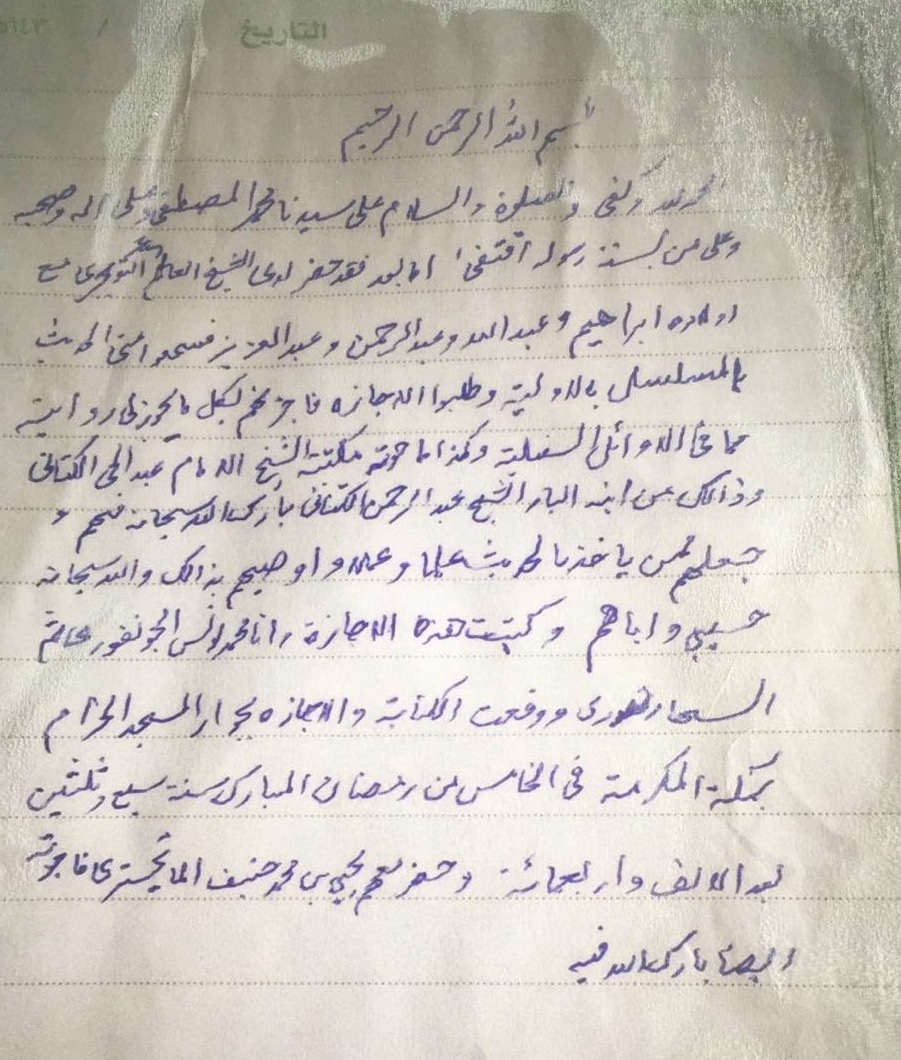
Marriage and family
Shaykh’s commitment and devotion to the sacred sciences and in particular the science of ḥadīth can be further gauged from the fact that he did not get married. He followed in the footsteps of great luminaries like Imam Nawawī, Shaykh al-Islam Ibn Taymiyah and others who decided not to marry out of their commitment and devotion to the sacred sciences and to the service of the faith, not because they opposed marriage or regarded it as contrary to the Sunnah. Indeed, Shaykh expressly writes that denying the concept of marriage is akin to disbelief. Shaykh ʿAbd al-Fattāḥ Abū Ghuddah’s famous treatise is worth reading in this regard. My respected father Mufti Shabbīr Aḥmad confirms that it is a misconception that Shaykh did not marry because of some physical illness. It is true that later in life Shaykh would say that I am now too old to marry.
Shaykh leaves behind three nieces and eight nephews, four of whom are also scholars. Since his appointment as a teacher, Shaykh always resided in the seminary and would say that my students are my family and encourage them to give charity on his behalf after his demise. Shaykh lived a life of loneliness, his mother passed away whilst he was five and his father passed away in 1987. Shaykh had one brother who also passed away in 1995.
Zuhd, piety and selflessness
Shaykh’s commitment to the Prophetic ḥadīths and his academic credentials are well known. A facet of his life which is perhaps less well known is Shaykh’s piety, zuhd and selflessness. My respected father Mufti Shabbīr Aḥmad once said, “I have not seen anyone more selfless than Shaykh.” This morning, before my respected father departed for India, he informed me that Shaykh would regularly give him large amounts of money, sometimes hundreds of thousands Indian Rupees and send him to Maẓāhir al-ʿUlūm Qadīm as well as Maẓāhir al-ʿUlūm Jadīd to donate the money. This was regular and Shaykh would make significant contributions to both institutes. Understanding the context of this is necessary. In the 80s, the seminary split into two with Shaykh staying at Maẓāhir al-ʿUlūm Jadīd and major differences emerged with court battles which unfortunately continue to date. Despite this, Shaykh always remained objective and maintained relations by supporting the other seminary with large amounts of funds too. In fact, Shaykh once mentioned to my respected father that he has donated a house, which was gifted to him, to Maẓāhir al-ʿUlūm Qadīm. On one occasion he mentioned that for every book that has two copies, he has endowed a copy each to both seminaries. My father suggests that before his demise Shaykh had donated second copies of many of his books to Maẓāhir al-ʿUlūm Qadīm. Shaykh’s passion for charity was such that for the past few years he had informed Ḥājī Ajmal of Saharanpur to sacrifice a goat on his behalf every day and distribute the meat to the poor.
Shaykh’s simplicity and selflessness is such that he spent his entire life in a room within the seminary. Shaykh himself mentions that during the first few years of becoming a teacher, he would take a salary from the seminary. However, he decided after a few years to adopt the path of tawakkul (total reliance on Allah) and stopped taking a salary. This proved extremely difficult for a few months and Allah Almighty opened other doors and accepted his supplication. Overall, Shaykh has endured lots of hardship and illnesses and was also affected by magic. Over the past few years, he would sleep on the floor in his room surrounded by books. Even when Shaykh would travel to Saudi Arabia and stay in the Kaʿbah view apartments of Shaykh Bakr bin Laden, he would sleep on the floor.
Shaykh’s assistant Mawlānā Yūnus Randerā informed me today that every year Shaykh would receive thousands of pounds of gifts from his visits to the UK and Ḥaramayn. Shaykh would say to Mawlānā Yūnus to distribute all the money for the taḥfīẓ project in Ḥaramayn or for some other good cause. In his most recent visit two months ago to Reunion, UK and Ḥaramayn, Shaykh received tens of thousands of pounds as gifts. All of this was donated for the taḥfiẓ project and Shaykh did not take a single penny back to India. Shaykh was very supportive of children memorising the Qurʾān. In doing so, Shaykh was following the Sunnah of the Prophet ﷺ who would immediately distribute whatever he would receive. What is even more amazing is that several years ago, Shaykh visited the UK and was informed that one of his students in the UK is in debt. Shaykh sent him £1,000 from his own money which he had received as gifts. I have never heard of an Indian scholar, let alone a scholar who is not financially wealthy, gift money to a person in the UK. It is unheard of. Once Shaykh fell ill in the UK and later my father on his visit to India gave him £3,500 which people had gifted to Shaykh. Shaykh declined to take the money and insisted to my father to accept it. He said: Use it in the wedding of your daughters. There are many more examples of Shaykh’s detachment from the world and selflessness. Shaykh often described how in his early years he only possessed one bowl and would use it for cooking, eating, drinking, washing and other purposes. Shaykh was so poor that he did not have money to afford medicine or even paper to write on. This is why so many of his invaluable notes are written on the back of envelopes, postcards and old diaries. As my respected father says that Shaykh’s early life was spent in poverty without choice and Shaykh’s latter life was also spent in poverty by his own choice. Mawlānā Khalīl ibn Mawlānā Ḥāshim narrates that in the 90s, Shaykh would visit Muftī Maḥmūd Ḥasan Gangohī in Deoband every Thursday evening. He would travel via bus from Saharanpur to Deoband and return on Friday morning. He would generally travel alone because he could not afford the nominal bus fare for an assistant to accompany him. On one occasion, Mawlānā Khalīl mentions that he accompanied Shaykh to the Deoband bus stop to drop him off. As they arrived at the bus stop, he decided to give Shaykh several hundred rupees by way of gift. Upon receiving it, Shaykh commented, “I was thinking how I will afford the bus fare, as I do not have any money.”
Shaykh’s piety and taqwā is also worth mentioning. Mawlānā Yūnus narrates that a few years ago when Shaykh fell extremely ill, he phoned Ḥaḍrat Mawlānā Ṭalḥa Ṣāḥib, the son of Mawlānā Muḥammad Zakariyyā Kāndhelwī requesting forgiveness for a small piece of a newspaper which he had used in the era of his father from his house without his explicit permission. Shaykh explained that he has never used anyone’s possessions without their permission except on this one occasion in the house of Mawlānā Muḥammad Zakariyyā Kāndhelwī when Shaykh came across a reference and urgently required paper to make a note of it. He had no paper so he cut the side of a newspaper without taking express permission from the owner, Mawlānā Muḥammad Zakariyyā Kāndhelwī. Shaykh remembered this and sought forgiveness from his son Mawlānā Ṭalḥa. This is a quality we observed in Shaykh regularly, to seek forgiveness and encourage others to forgive. Shaykh would regularly quote the statement of Ḥaḍrat Mawlānā Ṣiddīq Bāndwī who said, “Forgive without being asked for forgiveness.” Another example of Shaykh’s caution is that a few years ago, Shaykh decided to purchase several new books for the seminary’s library despite those books existing in the library. Shaykh explained that he would regularly use some books from the library and sometimes add some useful references and notes therein. Whilst this was only adding value to the books and is of immense benefit to the reader, Shaykh decided to purchase new books by way of precaution.
I have heard my respected father mention on numerous occasions, and I have also experienced this personally, that Shaykh generally adopts the cautious view in matters of jurisprudence. On one occasion in 2004 in the month of Ramaḍān, I was present in Saharanpur when a traveller led the Ḍhuhr Ṣalāh and did not shorten the Ṣalāh. When this was mentioned to Shaykh most probably at ʿAṣr time, despite his status and knowledge, he said consult with Mufti Shabbīr. My father suggested that there is no need to repeat the Ṣalāh not least because the person was a resident according to the other schools of thought, a view shared by Shaykh, as he had already resided for more than four days. Thereafter, ʿAṣr Ṣalāh, Maghrib Ṣalāh and ʿIshāʾ Ṣalāh were performed. I recall before Tarāwiḥ Ṣalāh commenced, Shaykh called my father and said that the majority of the people present are adherents of the Ḥanafī school of thought and although the obligation of the time (farīḍat al-waqt) has been fulfilled, we should repeat the Ṣalāh. Thus, all four prayers Dhuhr, ʿAṣr, Maghrib and ʿIshāʾ were repeated. This demonstrates Shaykh’s caution in such jurisprudential matters.
Shaykh’s piety was such that I once heard him say that I have only uttered a lie thrice and all three occasions were during my youth, once in fear of my mother, once in fear of my father, and once in fear of my teacher Mawlānā Ḍiyāʾ al-Ḥaq. Apart from these occasions, I have never lied.
Love of the Sunnah
One of the qualities that Shaykh will be remembered for is his uncompromising love of the Sunnah and his devotion to the ḥadīths. So much can be written in this regard. Shaykh left no stone unturned when it came to following or practising or defending the Sunnah and refuting innovations. I have witnessed Shaykh rebuke those who trim or shave their beards citing the Prophetic Sunnah. Likewise, Shaykh has no hesitation in refuting practices or ḥadīths that are not substantiated, for example, the sole fast of 15 Shaʿbān and regarding it as Sunnah. Shaykh would regularly say, “The soul is reformed and purified by adhering to the Sunnah.” Shaykh would also say, “Taṣawwuf in reality is following the Sunnah with the correct intention.” He would also say, “Whoever follows the Sunnah, he does not need to worry about his Dīn or Dunyā. Allah looks after him.” He would also say, “Be punctual with Masnūn supplications. A short Masnūn supplication is superior to a long waẓīfa which is not from the Sunnah.” He would also say, “Feed your guests with the intention of Sunnah.” Whenver Shaykh would teach ḥadīth or listen to ḥadīths he would not do so except in the state of ablution. In recent years when this became difficult because of his illness, we would observe him performing ablution and where not possible perform tayammum.
Mawlana Yūnus Randera mentioned to me that since 2002, he performed Hajj with Shaykh every year consecutively and thus performed sixteen Hajj with Shaykh and many ʿUmrah. Prior to this, Shaykh performed Hajj on many occasions and it is my estimate that Shaykh performed approximately thirty five Hajj. I also had the opportunity to perform Hajj with Shaykh once in 2002 and Shaykh stayed in our room. Shaykh would always reside in Mina on 13th Dhū al-Ḥijjah in accordance with the Sunnah. On one occasion, the 13th was a Friday and Shaykh said I will perform the Jumuʿah Ṣalāḥ in Mina and not in Masjid al-Ḥarām because it is Sunnah to stay in Mina on the 13th. During Hajj, Shaykh would always perform the stoning of the devil at the Sunnah time and in the Sunnah position. A few years ago when Shaykh was extremely ill, he was advised to avoid the rush hour. He refused and said I will go and I will die if I have to die whilst practising the Sunnah.
Two years ago, I also learnt that whilst travelling in Madinah Munawwarah, Shaykh would avoid using the AC and prefer to take in the blessed natural air of Madinah. Shaykh’s love of the Sunnah was such that despite his weakness he would visit the date trees orchard in Madinah Munawwarah. When he would consume the dates of Madinah Munawwarah, he would not throw the seeds in the bin but instruct for them to be buried out of respect.
Dreams regarding Shaykh
It should therefore not come as a surprise that many people have seen good dreams regarding Shaykh. An Arab scholar saw a dream more than a decade ago wherein the Prophet ﷺ described Shaykh as Amīr al-Muʾminīn fī al-Ḥadīth (the leader of the believers in ḥadīth).
A dream that is relevant to his demise was seen by his Arab student and disciple Shaykh Muḥammad ibn Aḥmad al-Ḥarīrī. Three years ago, he saw the Prophet ﷺ in his dream covered in a cloth, and when he uncovered his face, the person with the closest appearance was Shaykh. Today, Shaykh Ḥarīrī received the photographs of Shaykh and the surrounding scenary and suggested that the image was exactly what he saw in his dream three years ago including the greenery in the background.
Similarly, a local scholar from Manchester saw a dream today in which he saw Shaykh enter the Baqīʿ graveyard in the blessed city of Madīnah and raising his hands to make duʿā.
Another scholar saw a dream that Shaykh is sitting with another pious saint on a bed. Both have a glass in their hands and are enjoying the tasty drink.
Some personal experiences
My respected father Mufti Shabbīr Aḥmad was very close to Shaykh and Shaykh treated us as though we were his family members and vice versa. For us, he was a fatherly figure who we would look up to since we were young and he would take a keen interest in our affairs. The close relationship with my father began in Shawwāl 1398 when my father enrolled in the penultimate year of the Alim course at the seminary in Saharanpur, where he also completed the Iftāʾ programme. During the three years, my father developed a very close relationship with Shaykh. He would cook for Shaykh daily and attend to his other needs. My father recalls that because of Shaykh’s poverty, he would instruct him to last a pigeon for two or three days when cooking food. Such was the relationship that Shaykh would call my father into his room and seek his support in marking examination papers for some of the classes and would confide in him. My father would read the matn (text) of both Ṣaḥīḥ al-Bukhārī and Ṣaḥīḥ Muslim, and also read the entire Muwattāʾ Muḥammad on two occasions. It was through Shaykh’s blessings that my father developed a close attachment with the ḥadīths. Shaykh was not initially happy at him doing Iftāʾ, however, he advised him to stay connected with the ḥadīths at all times, a very useful advice which my respected father has always acted upon. When my father was leaving Saharanpur at the end of the three years to return to England, Shaykh came on a cycle rickshaw to Saharanpur train station to bid him farewell. Shaykh Yūsuf Tankārwī suggests that this is the only time Shaykh bid a student farewell in this manner. When my father started teaching at Darul Uloom Bury, the seminary decided at one point to allocate different chapters of the Ṣiḥāḥ Sittah to different teachers. When Shaykh found out he wrote to my father advising him that he should teach Ṣaḥīḥ Muslim with full commentary throughout and that he would inform the Principal accordingly. My father says that it is a result of Shaykh’s supplication and advice that he has been able to teach all the books that he has taught over the past 35 years with complete and comprehensive commentary from beginning to end.
As a young child from the age of five, I recall when my father would write letters to Shaykh, we siblings would also write to Shaykh in English and subsequently in Urdu. My mother would always ensure we write something in large English fonts.
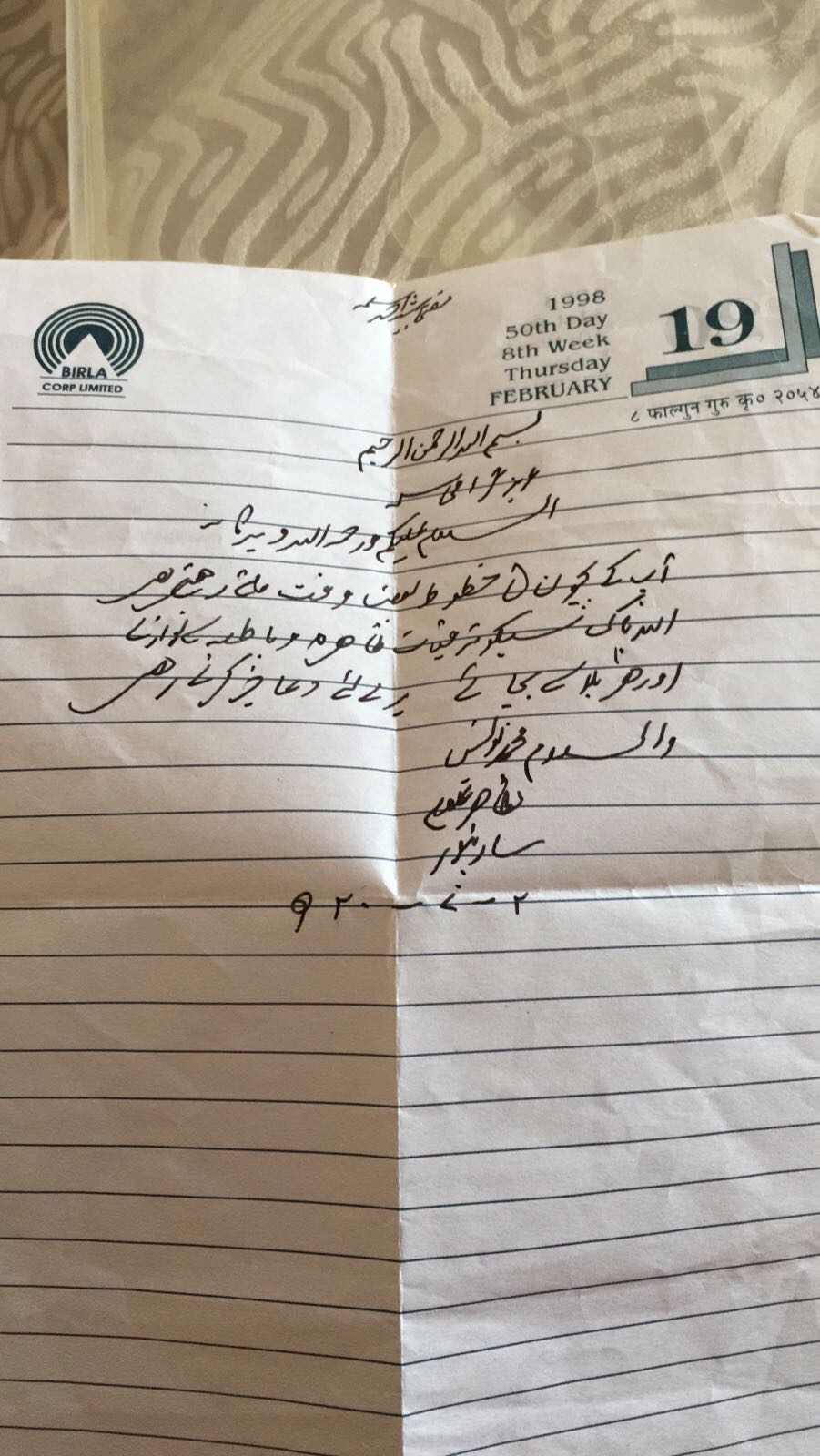
I recall once writing to Shaykh when I started the penultimate year requesting his supplications and asking if he has the Isnads (chains) of Imam Tabrīzī, the author of Mishkāt al-Maṣābīh, to the authors of the books which he quotes from. Shaykh replied in the negative. My first recollection of meeting Shaykh was in 1997 when our parents took us five brothers and sisters to India for two months to tour all the famous seminaries in Uttar Pradesh and elsewhere and meet with great saints and luminaries such as Shaykh Abū al-Ḥasan ʿAlī Nadwī. We stayed with Shaykh for several weeks in Saharanpur and also travelled with Shaykh to Banda on the train. Although I was only nine years old, I recall Shaykh’s affection as he insisted we travel in a higher class with AC whilst he decided to travel in a lower class. My mother, may Allah Almighty bless her, recalls that I and my younger sister fell ill in Banda. Shaykh came especially to our room on the upper floor to pray for us and fulfil the Sunnah of visiting the sick.
In this visit to Shaykh in 1997, we were also accompanied by my uncle Mohammad Patel and also by Mawlānā Muḥammad Dīdāt, the former librarian of Darul Uloom Bury, regarding whom Shaykh once said two months ago, “Muḥammad Dīdāt is ʿAllāmat al-Kutub (master of books), he has fallen ill, it is difficult to find such people, people will recognise his worth after he passes away.” This is the same Mawlānā Muḥammad Dīdāt, the only person who I have seen Mufti Muḥammad Taqī ʿUthmānī kiss his forehead on three separate occasions.
Throughout this visit in 1997 and other interactions, Shaykh would fondly address my father similar to how a father addresses his child and recall his student days, and also remember our grandparents. He would comment that our grandfather Aḥmad Ismāʿīl Patel (d. 1409/1988), who was very close to Mawlānā Badr ʿĀlam Mīrthī, has ṭabʿī taqaddus (holiness by nature). In 2000, he also visited his grave in Blackburn. During this visit to India in 1997, we also visited Jownpūr and Shaykh’s birth place and had the honour of meeting Shaykh’s teacher Mawlānā ʿAbd al-Ḥalīm Jownpūrī. This is the same Mawlānā ʿAbd al-Ḥalīm Jownpūrī who advised my respected father to follow his Shaykh referring to Shaykh Yūnus Ṣāḥib in all matters except in relation to marriage. Mawlānā ʿAbd al-Ḥalīm Jownpūrī visited the UK only once in 1985 and was very pleased to learn of the birth of my eldest brother Mawlānā Muḥammad.
As I grew up, there were many more opportunities in the UK and Saudi Arabia to spend time with Shaykh and benefit from him. I visited him many times in India and even when I was alone, he would be extremely generous and hospitable. He would not allow me to return except after feeding me. Shaykh visited our parent’s house on many occasions and also stayed the night on more than one occasion. On one occasion, I recall that the family had baked a cake in the shape of Ṣaḥīḥ al-Bukhārī and Shaykh did not hesitate in suggesting this is not appropriate. On one of his visits, he told me father that I did not want to visit the UK but I only came because I heard you were not well. On one occasion in Shaʿbān 1434 (2013), I had the honour of reciting ten pages of Sunan al-Tirmidhī to Shaykh in Bolton at the residence of our late teacher Shaykh ʿUmarjī (d. 1435/2014), a disciple of Shaykh and someone who had utmost respect and admiration of Shaykh. During this visit, Shaykh also visited my house. Shaykh’s visits to the UK were an opportunity Shaykh ʿUmarjī and other associates of Shaykh would always look forward to. This was the only time when my respected father would miss his teaching duties, he would not even miss his teaching duties during the birth of his children.
Shaykh has had a huge influence on me both directly and indirectly through my teachers, the majority of whom are also students of Shaykh or their students. Before I joined the final year of the Alim class, Shaykh placed his hand on my head, supplicated for me and advised me in his room in India and said: When you read the ḥadīths, read it from the Prophetic lenses, as though the Prophet ﷺ is instructing you and talking to you. Do not read the ḥadīths with anyone else’s lenses. This advice is of particular relevance for students and scholars and assisted me in my final year and beyond, and all praise belongs to Allah alone.
Demise
After completing Ṣaḥīḥ al-Bukhārī in Saharanpur two to three months ago, Shaykh travelled to the UK to participate in the completion of the Ṣaḥīḥ in Darul Uloom Blackburn and other institutes. May Allah reward our beloved Mufti ʿAbd al-Ṣamad Aḥmad for inviting Shaykh year on year and hosting all the guests. From the UK, Shaykh travelled to Saudi Arabia for Umrah where Mawlānā Yūnus and my elder brother Mawlānā Muḥammad accompanied him. After spending a few days of Ramaḍān in Saudi Arabia, he travelled to India and spent the remaining month in Saharanpur. During Ramaḍān, he fasted all the days and performed the night prayer. During the final ten days, more than hundred students and associates spent time in the company of Shaykh. One of Shaykh’s final advices to the senior teachers in Saharanpur on 7 Shawwāl was to stay away from fitnah (turmoil) as it is more severe than killing. On the Friday before Shaykh passed away, he undertook a bath and arrived at the mosque very early, it was always his habit on Fridays to arrive at the mosque early.
On Saturday, we received reports that Shaykh has fallen ill. It was not thought, at least initially, that the illness was in any way life threatening. Allah is the best of planners and He is the wisest. This morning at 7.30am local time, Shaykh became unconscious or semi-unconscious and was taken to hospital and he passed away there. He passed away at approximately 5am British Summer Time (9.30am local time) on Tuesday 11 July 2017 / 17 Shawwāl 1438 (16 Shawwāl in India). Shaykh’s disciple Qārī Ayyūb Ṣāḥib, who is based in Saharanpur narrates that yesterday (Monday) he visited Shaykh and Shaykh confided in him that he does not want any more medication or treatment, because someone came and informed him that do not do any treatment, otherwise you will remain in this condition. Then he said to Qārī Ṣāḥib thrice: Have you understood this? He added do not tell anyone otherwise they will take me to the doctors. The following day Shaykh passes away and does not leave anything behind except his invaluable collection of books and some other personal belongings and a small amount of money. Shaykh’s assistant mentions that a day before Shaykh passed away, he was reading the maknaz edition of Musnad Aḥmad which was gifted to him recently.
Shaykh’s Janāzah Ṣalāh was led by Ḥaḍrat Mawlānā Ṭalḥa Ṣāḥib, with whom he enjoyed a very good and frank relationship. It is worth noting that Ḥaḍrat Mawlānā Ṭalḥa Ṣāḥib was extremely close to Shaykh and for many decades would send food for him and his guests on a daily basis. Shaykh would also reciprocate by sending gifts regularly. The Janāzah Ṣalāh was peformed in the Ḥājī Shāh graveyard after ʿAṣr Ṣalāh. Reports suggest that the Janāzah Ṣalāh was attended by approximately 1 million people. This has been confirmed by Mawlānā Junaid Ṣāḥib, the son in law of Mawlānā ʿĀqil Ṣāḥib. Other estimates suggest 200,000 people though this appears to be an underestimation. A more accurate estimate suggests 450,000 to half a million. Either way, this reminds us of the Janāzah of Imam Aḥmad ibn Ḥanbal in Baghdad that was attended by 800,000 people and the Janāzah of Shaykh al-Islam Ibn Taymiyah in Damascus that was attended by 200,000 people. Shaykh had immense love for both Imams. Qārī Ayyūb Ṣāḥib, one of Shaykh’s disciples, who was also present in the Ghusl of Shaykh describes how the numbers of people were such that people were unable to pick up what was dropped. There were slippers and other possessions found later in the area. Local people suggest that Saharanpur has never seen such a Janāzah. This despite the fact that many people from other parts of India and elsewhere were unable to reach Saharanpur. The Prophet ﷺ said, ‘If Allah loves a person, He calls Jibrīl: “Allah loves so and so, O Jibrīl, love him.” So Jibril loves him, and then Jibrīl makes an announcement among the residents of the Heaven, “Indeed, Allah loves so-and-so, therefore, you love him.” So, all the residents of the Heaven love him and then he is granted the acceptance among the people of the earth’ (Ṣaḥīḥ al-Bukhārī, 6040). Shaykh is clearly an example of this. There were no relatives or family members present in his Janāzah Ṣalāh. Some of his closest students from Gujarat and other regions were unable to reach in time. Herein is a lesson for some people who accused Shaykh of not adhering to the way of the elders. As Imam Aḥmad ibn Ḥanbal is reported to have said, ‘Say to the People of Innovation, “Between you and us is the funerals”’ (Manāqib al-Imām Aḥmad, p.560).
Shaykh was buried as per his wishes close to his beloved teacher Mawlānā Asʿadullāh Rāmpūrī. It was Shaykh’s waṣiyyah that Sūrah al-Fātiḥah be recited in the Janāzah Ṣalāh. It was also Shaykh’s waṣiyyah to place a piece of the Kaʿbah’s cloth and soil from the blessed city of Madīnah in his grave. This was duly acted upon and actioned after the burial.
May Allah Almighty shower his mercy on Shaykh, grant him an abode in paradise and resurrect him with the Prophets, martyrs and pious people. Shaykh was always opposed to digital photography and did not regard the distinction between digital and non-digital photography as material. He requested Shaykh al-Islam Mufti Muḥammad Taqī ʿUthmānī Ṣāḥib on two separate occasions to re-consider the issue. It is therefore requested from all well wishers to avoid circulating photos or images of Shaykh whether taken before or after his demise, irrespective of your personal views on the matter.
Conclusion
It has been difficult to pen some of the above as the news of Shaykh’s demise is still being digested and the reality is sinking in. The death of a scholar is the death of the world. You only fully appreciate a bounty when it does not exist. The following are some thoughts that come to mind to benefit Shaykh and build on his legacy:
Firstly, it was Shaykh’s desire and instruction to his students to give charity on his behalf. Thus, all students, well wishers and readers are requested to donate whatever possible on behalf of Shaykh for the projects of their choice. Charity is the most powerful way of assisting and benefiting the deceased. With the will of Almighty Allah and after consulting with Shaykh’s senior students, Insha Allah, we will be aiming to build a mosque on Shaykh’s behalf with the option for people from all over the world to contribute towards this. Insha Allah, the details will be shared within the next few days.
Secondly, we need to reflect on Shaykh’s life and take heed accordingly. Shaykh’s life long service and love of the Sunnah, opposition to innovations, commitment to the ḥadīths and opposition to fabricated or baseless narrations and practices, championing authentic practices, his piety, adab and respect for scholars from different backgrounds, selflessness, charitable endeavour and zuhd are all part of his legacy. Some of his discourses are available on this link for those who are interested in reading more. Undoubtedly, more will be shared over the course of next few days for people to reflect and ponder upon.
Thirdly, it would be good for a group of Shaykh’s students to form a team to publish his works in a coordinated manner under the supervision of the senior students of Shaykh. This is particularly important because many of Shaykh’s writings were not originally written for publication, and the same applies to his audio recordings.
May Allah Almighty shower his mercy on Shaykh, grant him an abode in paradise and resurrect him with the Prophets, martyrs and pious people. May Allah bless Maẓāhir al-ʿUlūm Saharanpur with a good replacement and protect it as well as Maẓāhir al-ʿUlūm Qadīm from all forms of evil and turmoils. Āmīn.
Yusuf Shabbir
17 Shawwāl 1438 / 11 July 2017
To read more about Shaykh’s academic credentials, click here.
To read more articles and obituaries, click here.

